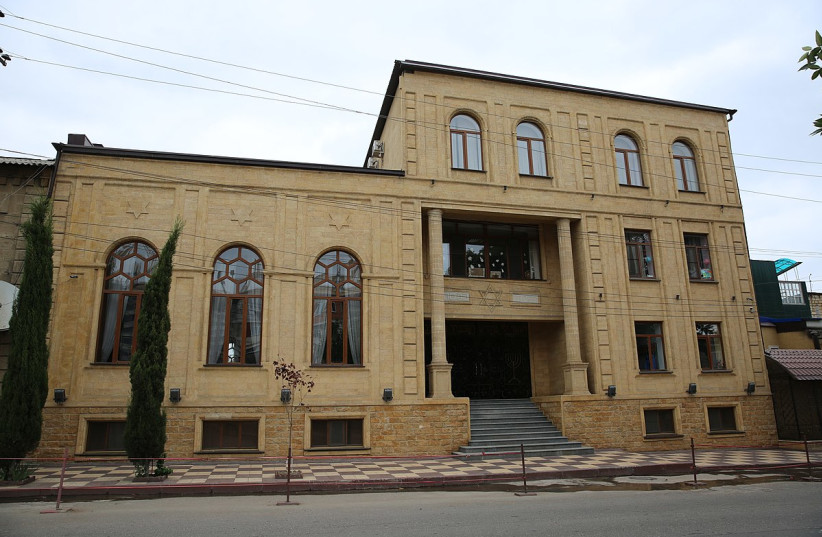The Jewish community in Dagestan, primarily consisting of Mountain Jews, has a rich history and faces unique challenges in recent years. The Mountain Jews, also known as Tats, trace their origins back to Persian-speaking regions and have lived in the Caucasus since at least the 8th century.
This community has preserved its distinct cultural and religious practices despite geographical and political isolation. Historically, Mountain Jews settled in various parts of Dagestan, with significant populations in cities like Derbent and Makhachkala. Derbent, one of the oldest cities in the region, has been a central hub for Jewish life, boasting multiple synagogues before the Bolshevik Revolution. Today, only the Kele-Numaz Synagogue remains active in Derbent, serving as a focal point for the dwindling Jewish population, according to reports.
Dagestan, a republic in Russia's North Caucasus, borders the Caspian Sea to the east and Georgia and Azerbaijan to the south. Its capital is Makhachkala. Known for its ethnic diversity, with over 30 ethnic groups and 100 languages, Dagestan predominantly practices Sunni Islam. The region has a complex history of resistance against empires and faces challenges like political instability and economic development, despite its resources in agriculture, oil, and industry.
During the Soviet era, Mountain Jews managed to maintain their religious practices discreetly, such as baking matzo for Passover and lighting Sabbath candles, far from the anti-Semitic policies prevalent in other parts of the Soviet Union. This cultural resilience continued despite the harsh conditions imposed by the Soviet regime, as noted by various sources.
In recent decades, the Jewish population in Dagestan has faced significant challenges. The collapse of the Soviet Union and subsequent regional conflicts, particularly the Chechen wars, have led to increased violence and instability. The rise of Islamic fundamentalism has further complicated the situation, causing many Jews to emigrate. For instance, the Jewish population in Dagestan has plummeted from around 50,000 to fewer than 10,000 in recent years, with many relocating to Israel, the United States, or other parts of Russia, according to the Jewish Telegraphic Agency.

Increased ethnic tensions
Despite their drastically diminished numbers, the Mountain Jews in Dagestan and elsewhere in the North Caucasus have maintained their communities. However, recent years have seen an increase in interethnic tension and acts of violence, prompting many to consider emigration for safety. Roman Ashurov, a prominent community member, highlighted the dangers faced, including kidnappings by Chechen gangs who targeted Jews for ransom, as reported by the Jewish Telegraphic Agency and Radio Free Europe/Radio Liberty.
In recent years, the Jewish community in Dagestan has faced significant threats, including a notable terrorist incident on October 29, 2023, when a mob stormed Makhachkala Airport in search of Jewish passengers arriving from Israel. This attack was incited by ongoing global antisemitic agitation linked to the conflict between Israel and Hamas. The mob, shouting antisemitic slogans, managed to breach airport security and caused significant chaos, leading to the airport's temporary closure and heightened security measures by local authorities, according to Jerusalem Post articles.
This incident wasn't isolated. Just earlier that day, a Jewish center under construction in Dagestan was set ablaze, with the words "Death to the Jews" inscribed on its walls. These events underscored a worrying rise in antisemitic violence in the region, exacerbated by geopolitical tensions and extremist propaganda.
Local and international Jewish leaders have expressed deep concern about the safety of Jews in Dagestan. Rabbi Pinchas Goldschmidt, the president of the Conference of European Rabbis, emphasized the need for Russian authorities to take decisive action against such extremism. Similarly, the Coordination Center for Muslims of the North Caucasus condemned the riots, highlighting the importance of maintaining interfaith harmony. This perspective was shared by both the Post and Radio Free Europe/Radio Liberty.
Despite these challenges, the Jewish community in Dagestan, particularly in cities like Derbent and Makhachkala, continues to strive for peace and coexistence. However, the recent violent incidents have prompted many to consider emigration for safety, adding to the long-standing trend of Jewish emigration from the region due to economic hardships and security concerns.
